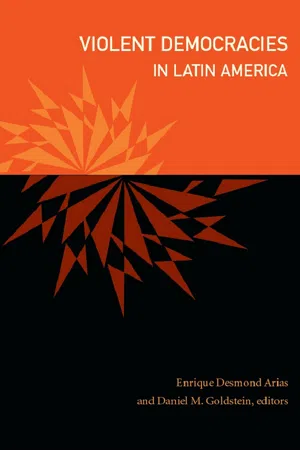
Violent Democracies in Latin America
- English
- PDF
- Available on iOS & Android
Violent Democracies in Latin America
About this book
The contributors—anthropologists, political scientists, sociologists, and historians—explore how individuals and institutions in Latin American democracies, from the rural regions of Colombia and the Dominican Republic to the urban centers of Brazil and Mexico, use violence to impose and contest notions of order, rights, citizenship, and justice. They describe the lived realities of citizens and reveal the historical foundations of the violence that Latin America suffers today. One contributor examines the tightly woven relationship between violent individuals and state officials in Colombia, while another contextualizes violence in Rio de Janeiro within the transnational political economy of drug trafficking. By advancing the discussion of democratic Latin American regimes beyond the usual binary of success and failure, this collection suggests more sophisticated ways of understanding the challenges posed by violence, and of developing new frameworks for guaranteeing human rights in Latin America.
Contributors: Enrique Desmond Arias, Javier Auyero, Lilian Bobea, Diane E. Davis, Robert Gay, Daniel M. Goldstein, Mary Roldán, Todd Landman, Ruth Stanley, María Clemencia Ramírez
Frequently asked questions
- Essential is ideal for learners and professionals who enjoy exploring a wide range of subjects. Access the Essential Library with 800,000+ trusted titles and best-sellers across business, personal growth, and the humanities. Includes unlimited reading time and Standard Read Aloud voice.
- Complete: Perfect for advanced learners and researchers needing full, unrestricted access. Unlock 1.4M+ books across hundreds of subjects, including academic and specialized titles. The Complete Plan also includes advanced features like Premium Read Aloud and Research Assistant.
Please note we cannot support devices running on iOS 13 and Android 7 or earlier. Learn more about using the app.
Information
Table of contents
- Contents
- Acknowledgments
- Violent Pluralism: Understanding the New Democracies of Latin America / Enrique Desmond Arias and Daniel M. Goldstein
- The Political and Economic Origins of Violence and Insecurity in Contemporary Latin America: Past Trajectories and Future Prospects / Diane E. Davis
- End of Discussion: Violence, Participatory Democracy, and the Limits of Dissent in Colombia / Mary Roldán
- Maintaining Democracy in Colombia through Political Exclusion, States of Exception, Counterinsurgency, and Dirty War / María Clemencia Ramírez
- Clandestine Connections: The Political and Relational Makings of Collective Violence / Javier Auyero
- "Living in a Jungle": State Violence and Perceptions of Democracy in Buenos Aires / Ruth Stanley
- Organized Violence, Disorganized State / Lilian Bobea
- Toward Uncivil Society: Causes and Consequences of Violence in Rio de Janeiro / Robert Gay
- Violence, Democracy, and Human Rights in Latin America / Todd Landman
- Conclusion: Understanding Violent Pluralism / Enrique Desmond Arias
- References
- Contributors
- Index